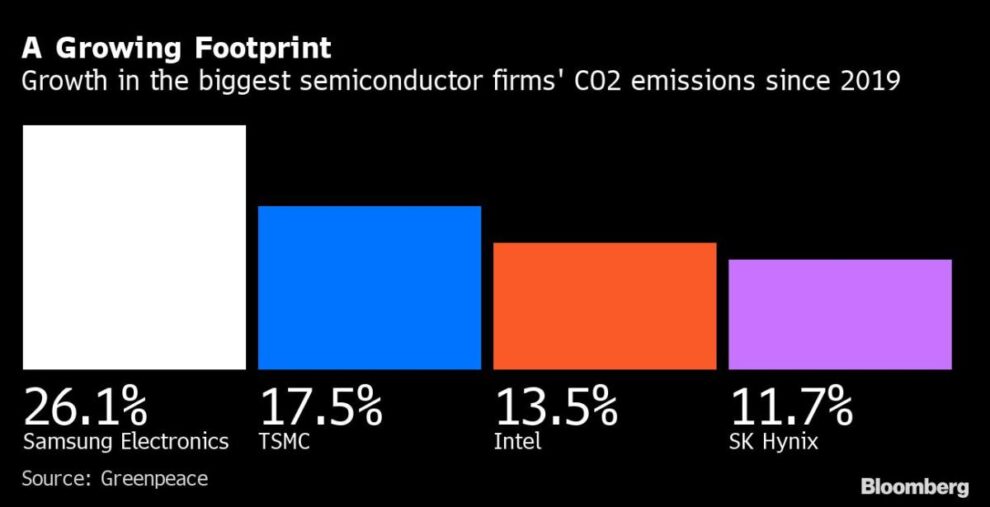
(Bloomberg) — Amazon.com Inc., Microsoft Corp. and Alphabet Inc. have pledged to run their own operations on 100% clean power. But their suppliers — the lesser known companies that make the key components of hit products like the Kindle, the Xbox or Pixel mobiles — remain deeply reliant on fossil fuels. Twelve of the 14 top suppliers get on average 5.4% of their energy from renewable sources or don’t disclose, data from a Greenpeace report released Friday showed. Their major clients, including HP Inc., Dell Technologies Inc., Lenovo Group, Sony Group Corp., LG Electronics Inc. and Samsung Electronics Co. share the blame, the organization said: Of 10 consumer electronics brands, only one — Apple Inc. — has designed an emissions strategy requiring its suppliers to achieve 100% renewable energy by 2030.
Most Read from Bloomberg
The big consumer electronics brands “have not provided sufficient incentives or support for their suppliers to decarbonize,” Greenpeace’s researchers concluded. They “have failed to set meaningful renewable energy targets where it really counts — in their supply chains.”
Google, Sony and Dell declined to comment, while representatives from Microsoft, HP, Lenovo and LG didn’t respond to Bloomberg’s emailed requests for comment. Amazon said it plans to power its operations with 100% renewable energy by 2025 and to zero out its carbon emissions by 2040. Samsung said it was committed to achieving net zero emissions by 2050.
At the heart of their supply chains are Asian chip behemoths like Taiwan Semiconductor Manufacturing Co. and SK Hynix Inc. that can guzzle as much power as entire countries to produce the advanced logic and memory chips that are now used in nearly everything. While their products are indispensable, they use fossil fuels to generate much of their power. In 2021, TSMC and Hynix reported renewable energy usage rates of only 9% and 4%, respectively.
Read more: The Chip Industry Has a Problem With Its Giant Carbon Footprint
Other suppliers included screen manufacturers like Japan Display Inc. and LG Display Co., the world’s largest contract electronics manufacturer Hon Hai Precision Industry Co., and Pegatron Corp., which produces motherboards, wireless systems and game consoles. Greenpeace said that the 10 tech companies and 14 suppliers studied used more than 170,000 gigawatt hours of power last year, on par with the annual electricity consumption of Argentina. By 2030, power used by the global tech sector is expected to be up 60% over 2020. That threatens to create severe supply issues and raises environmental concerns in manufacturing hubs.
Taiwan’s TSMC is sucking up as much electricity as Sri Lanka’s 21-million population and is expected to use up 12.5% of the island’s annual power consumption by 2025. More than half of Taiwan’s energy is generated from coal and fossil fuels. In South Korea, home to another critical chip-supplier, SK Hynix, the story is similar. The company’s chip factories consume power equivalent to 1.6 million South Korean households and more than 60% of the country’s power comes from burning coal and natural gas.
Apple is calling on its suppliers to address their greenhouse gas emissions, the company said in a statement Tuesday. The Cupertino, California-based company will “evaluate the work of its major manufacturing partners to decarbonize their Apple-related operations — including running on 100% renewable electricity — and will track yearly progress,” the firm said in the statement. TSMC is the sole producer of Apple’s Silicon processors that go into iPhones, iPads and Macs, while Hynix is a key memory provider for the same devices.
(Updates with additional suppliers in sixth paragraph)
Most Read from Bloomberg Businessweek
©2022 Bloomberg L.P.










